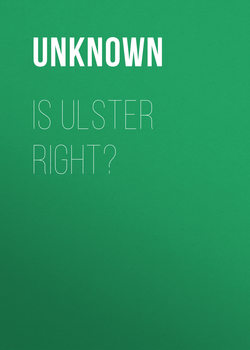Is Ulster Right?

Реклама. ООО «ЛитРес», ИНН: 7719571260.
Оглавление
Unknown. Is Ulster Right?
PREFACE
CHAPTER I. THE ULSTER COVENANT. THE QUESTIONS STATED. IRELAND UNDER THE CELTS AND THE DANES
CHAPTER II. IRELAND FROM THE TIME OF HENRY II TO THE TIME OF HENRY VIII
CHAPTER III. IRELAND UNDER THE TUDORS
CHAPTER IV. THE SEVENTEENTH CENTURY, UNTIL THE END OF THE REIGN OF JAMES II
CHAPTER V. THE PERIOD OF THE PENAL LAWS
CHAPTER VI. THE EARLIER PART OF THE REIGN OF GEORGE III. THE ACQUISITION OF INDEPENDENCE BY THE IRISH PARLIAMENT
CHAPTER VII. THE INDEPENDENT PARLIAMENT. THE REGENCY QUESTION. THE COMMENCEMENT OF THE REBELLION
CHAPTER VIII. THE REBELLION
CHAPTER IX. THE UNION
CHAPTER X. THE PERIOD FROM THE UNION UNTIL THE REJECTION OF THE FIRST HOME RULE BILL
CHAPTER XI. THE UNIONIST GOVERNMENT OF 1886
CHAPTER XII. THE GLADSTONIAN GOVERNMENT OF 1892. THE POLITICAL SOCIETIES
CHAPTER XIII. IRELAND UNDER THE PRESENT GOVERNMENT
CHAPTER XIV. CRITICISM OF THE BILL NOW BEFORE THE COUNTRY
CHAPTER XV. THE DANGER TO THE EMPIRE OF ANY FORM OF HOME RULE. THE QUESTIONS ANSWERED
THE MEMORY OF WOLFE TONE
AT THE GRAVE OF WOLFE TONE
Отрывок из книги
Such is the Solemn Covenant which 220,000 resolute, determined Ulstermen-of various creeds and of all sections of the community, from wealthy merchants to farm labourers-fully realizing the responsibility they were undertaking, signed on the 28th September, 1912. To represent that it was merely the idle bombast of ignorant rustics, or a passing ebullition of political passion coming from hot-headed youths excited by irresponsible demagogues, is folly. It expresses the calm resolution of earnest men who, having thought deeply over the matter had decided that it was better even to face the horrors of civil war rather than to submit to the rule of a Nationalist Government.
The opinions of the Nationalists with regard to the Ulster Covenant can be gathered from many speeches and sermons. The following extract from one of their papers-the Frontier Sentinel-may be taken as a specimen:-
.....
The Celtic Church no doubt had its golden age. It produced saints and men of learning. It sent out its missionaries to the heathen beyond the seas. So famous were its schools that students came to them from distant lands. But centuries before the Normans appeared in Ireland the salt had lost its savour. The Celtic Church had sunk into being a mere appendage of the wild tribes it had once tried to tame. The chiefs of one tribe would sack the colleges and shrines of another tribe as freely as they would sack any of their other possessions. For instance, the annals tell us that in the year 1100 the men of the south made a raid into Connaught and burned many churches; in 1113 Munster tribe burned many churches in Meath, one of them being full of people; in 1128 the septs of Leitrim and Cavan plundered and slew the retinue of the Bishop of Armagh; in the same year the men of Tyrone raided Down and a great number of people suffered martyrdom; four years later Kildare was invaded by raiders from Wexford, the church was burnt and many men slain; and so on with dreary monotony. Bishops and abbots fought in the incessant tribal wars as keenly as laymen. Worse still, it was not infrequent for one band of clergy to make war on another. In the ninth century, Phelim, who claimed to be both Bishop and King of Leinster, ravaged Ulster and murdered its monks and clergy. In the eleventh century the annals give an account of a fierce battle between the Bishop of Armagh and the Bishop of Clonard. Nor did time work any improvement; we read of bloody conflicts between abbots and bishops as late as the middle of the fifteenth century. What influence for good could such a church have had upon the mass of the people?
And even in its noblest period the Celtic Church seems to have had but little power beyond the walls of its own colleges. The whole history of Celtic Ireland, as we learn from the annalists, was one miserable succession of tribal wars, murders and plunderings. Of course it may be said with perfect truth that the annals of other countries at the time tell much the same story. But there is this difference between them: wild and barbarous though the wars of other countries were, they were at any rate the slow and painful working up towards a higher civilization; the country became consolidated under the most powerful chief; in time peace was enforced, agriculture improved, and towns grew up. The tribal raids of Celtic Ireland, however, were merely for plunder and destruction. From such conflicts no higher state of society could possibly be evolved. The Irish Celts built no cities, promoted no agriculture, and never coalesced so as to form even the nucleus of a united kingdom.
.....